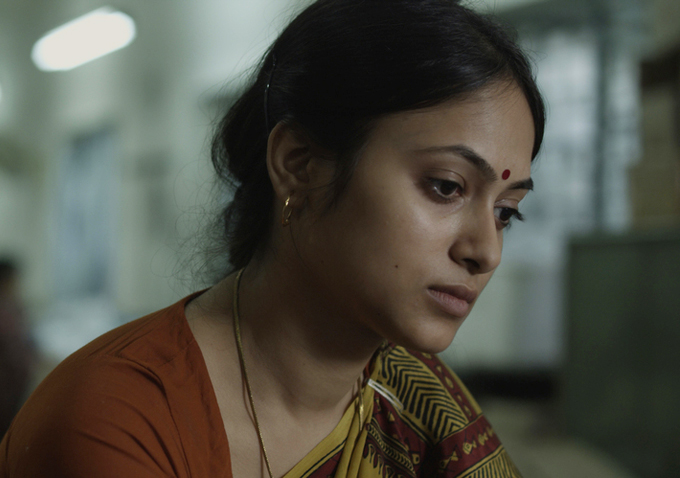 It’s extremely hard to pull off what writer-director Aditya Vikram Sengupta attempts in his first feature, “Labour of Love,” and he does, to a point. A film without a word of dialogue, “Labour of Love” is a glimpse into a day in the life, a simple love story, and a could almost be considered a city symphony of sorts. Which Sengupta deftly and quietly achieves, until a last minute choice nearly upsets the whole thing.
It’s extremely hard to pull off what writer-director Aditya Vikram Sengupta attempts in his first feature, “Labour of Love,” and he does, to a point. A film without a word of dialogue, “Labour of Love” is a glimpse into a day in the life, a simple love story, and a could almost be considered a city symphony of sorts. Which Sengupta deftly and quietly achieves, until a last minute choice nearly upsets the whole thing.
The recent recipient of the Best Directing Prize at the Marrakech International Film Festival, Sengupta indeed has a lovely and light touch on the material. The film opens with the sound of a news report on the rampant unemployment in India, setting the context for what we are about to see. We follow a young woman (Basabdutta Chatterjee) on her way to work and through her daily routine. She goes about her job at a factory quietly and diligently, eats a home cooked lunch alone, not interacting with much of anyone really. This routine is intercut with a man (Ritwick Chataborty) at home, going through his own routine: daily ablutions, buying groceries, napping in the breeze of a ceiling fan.
 As her day draws to a close, his begins, as he prepares to leave for his night job at a printing press. Suddenly, all becomes clear: these two are a couple. Their jobs keep them apart and they pass like ships in the night. This is when the unemployment news becomes important to the story. With the crisis, there’s no way they could quit their jobs, despite the difficult situation.
As her day draws to a close, his begins, as he prepares to leave for his night job at a printing press. Suddenly, all becomes clear: these two are a couple. Their jobs keep them apart and they pass like ships in the night. This is when the unemployment news becomes important to the story. With the crisis, there’s no way they could quit their jobs, despite the difficult situation.
Once they trade positions, one at work and one at home, and the situation is revealed, the drama of the story is amped up. You find yourself rooting for him to get home just so they can see each other for a quick minute. As she prepares his meals, you wish for him to return and share it with her. One finds themselves urging the wheels of a bicycle along, in hopes that they might meet.
 The film is firmly grounded in a realistic and naturalistic world and aesthetic, until the final few moments of the film, and you find yourself wishing so much that Sengupta had kept it rooted in reality. The point that he is trying to make is already obvious and doesn’t need further underlining, which unfortunately tips it into sentimentality.
The film is firmly grounded in a realistic and naturalistic world and aesthetic, until the final few moments of the film, and you find yourself wishing so much that Sengupta had kept it rooted in reality. The point that he is trying to make is already obvious and doesn’t need further underlining, which unfortunately tips it into sentimentality.
Sengupta demonstrates a real knack and flair for cinematic visual storytelling, the camera picking up and examining small details, finding ways to show things in a new light. That he manages to tell such a rich story with dramatic thrust without any dialogue, the only words the news announcement and later, a loudspeaker-projected speech about unemployment demonstrations, is truly impressive. The film ultimately ends up feeling a bit slight and obvious, though, without much nuance to the story itself. Still, his talent is readily on display and the best directing prize is deserved for pulling off the task with such panache.
 A lovely and warm little tale, “Labour of Love” is a unique film for India: a complete opposite of the bombast of Bollywood. As Marrakech jury member and Indian independent filmmaker Ritesh Batra said of his film “The Lunchbox” during the press conference, he wanted to make an Indian film for a global audience, but he also managed to make an Indian film for an Indian audience. “Labour of Love” feels like it might also slot into this dual category. It’s a fresh aesthetic and approach for Indian cinema, but it’s also a specifically Indian film. [B+]
A lovely and warm little tale, “Labour of Love” is a unique film for India: a complete opposite of the bombast of Bollywood. As Marrakech jury member and Indian independent filmmaker Ritesh Batra said of his film “The Lunchbox” during the press conference, he wanted to make an Indian film for a global audience, but he also managed to make an Indian film for an Indian audience. “Labour of Love” feels like it might also slot into this dual category. It’s a fresh aesthetic and approach for Indian cinema, but it’s also a specifically Indian film. [B+]

